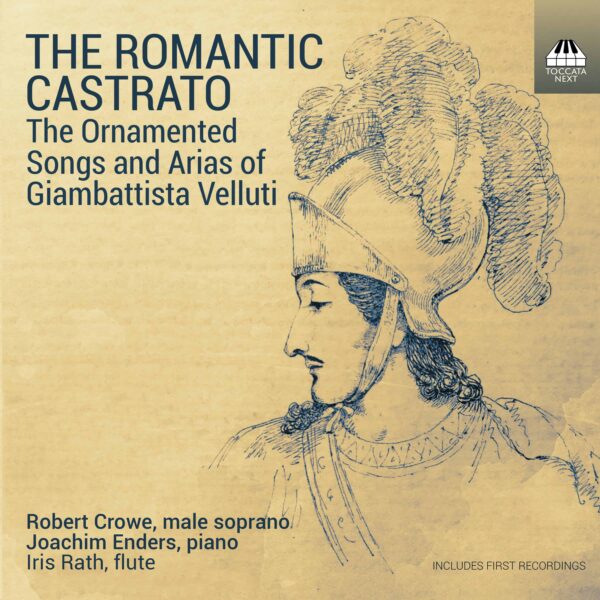The Romantic Castrato
Giovanni Battista Velluti (1780–1861) was one of the last of the larger-than-life castrati who had dominated operatic life in the seventeenth and eighteenth centuries. Velluti, though, spent his career almost entirely in the Romantic era, singing the music of his day. His style of ornamentation attracted widespread admiration and set the standard for the prime donne who were emerging as the stars of their age in operas by such composers as Rossini, Bellini and Donizetti. Here the American male soprano Robert Crowe recreates Velluti’s extraordinary sound-world, in a recording that helps explain why such diverse luminaries as Stendhal, Mary Shelley and the Duke of Wellington admired Velluti as one of the most accomplished and inventive singers of his time.
Robert Crowe, male soprano
Iris Rath, flute (Track 21)
Joachim Enders, piano
ALL EXCEPT * FIRST RECORDINGS
-
Giuseppe Nicolini (1762–1842)
- I Sinfonia –
- II Scena: ‘Ecco, o Numi’ –
- III Aria: ‘Ah quando cesserà’
- Cavatina: ‘T’abbracio, ti stringo’
- I Sinfonia –
- II Recitativo: ‘Che vuoi mio cor?’
- III Aria: ‘T’intendo mio cor’
- Tema con sei variazioni sopra l’aria della Molinara ‘Nel cuor più non mi sento’, WoO 70
- Theme
- Variazione 1
- Variazione 2
- Variazione 3
- Variazione 4
- Variazione 5
- Variazione 6
- Variazione 7
- Variazione 8
- L’Amor timido: Arietta: ‘Placido zeffiretto’
- I Sinfonia
- II Scena: ‘Notte tremenda’
- III Romanza: ‘Caro suono lusinghier’
- Air Venetien, arrangé en Rondo brillant pour le Piano Forte
- ‘Ah can I think of days gone by?’
Carlo Magno: Sinfonia, scena e aria ‘Ecco, o Numi – Ah quando cesserà’
Gioacchino Rossini (1792–1868)
Ciro in Babilonia
John Fane, Lord Burghersh (1784–1859)
L’Amor timido: Sinfonia, recitativo e aria: ‘Che vuoi mio cor? – T’intendo mio cor’
Ludwig Van Beethoven* (1770–1827)
Giovanni Battista Velluti (1780–1861)
Otto Variazioni sul’ Tema ‘Nel cor più non mi sento’
Burghersh (1780–1861)
Francesco Morlacchi (1784–1841)
Tebaldo e Isolina: Sinfonia, scena e romanza: ‘Notte tremenda – Caro suono lusinghier’
Johann Baptist Cramer (1771–1858)
Thomas Welsh (1780–1848)

Reviews
There are no reviews yet.